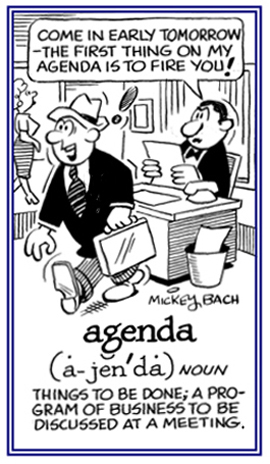Latin Proverbs, Mottoes, Phrases, and Words: Group A
(classical-language maxims, slogans, adages, proverbs, and words of wisdom that can still capture our modern imagination)
Expressions of general truths: Latin to English maxims, proverbs, and mottoes
Word entries are from Latin unless otherwise indicated.
So well-established is agenda as a singular that "agendas" is now commonly heard and seen as the plural form, however the correct Latin singular is agendum.
The agendum is whether the teaching staff wants an extended school year or not.
The agenda have been established for the next business meeting.


Go to this Word A Day Revisited Index
so you can see more of Mickey Bach's cartoons.
Also, Jacta alea est! Supposedly spoken by Julius Caesar, 49 B.C., when he crossed the Rubicon to challenge the Senate and Pompey's forces for supremacy of Rome. Crossing the Rubicon river resulted in the civil war and Pompey's defeat by Julius Caesar's forces.
Suetonius wrote that Caesar said, "Let us go forward whither the signs of the gods and the injustice of our enemies call us. The die is cast!" Another translation says, "Let us march on, and go wherever the tokens of the gods and the provocations of our enemies call us. The die is cast!" or "The die be thrown!"
What Caesar meant is that by crossing the Rubicon, he will have passed a point of no return, and fate would decide the outcome.
Also written as Jacta alea est!
Motto of Davidson College, Davidson, North Carolina, USA and Community College of Beaver County, Monaca, Pennsylvania, USA.
A transliteration of the Greek motto of Brandon University, Brandon, Manitoba, Canada.
This strongly suggests that someone's present efforts will prove fruitless so, "We must go back and try another approach."
"Samuel Langhorne Clemens, alias dictus was Mark Twain (1835 - 1910), who was an American author who wrote The Adventures of Tom Sawyer among several other novels."
2. Etymology: from Latin alias, "otherwise, at another time". Also from Latin dictus, the perfect passive participle of dico, "to say".Expressed by Seneca, in his writing titled, On Anger.
State motto of Oregon, (1848-1858) U.S.A.
Another version is, "A jack-of-all-trades, master of none." A description of someone who may have several general skills, or areas of knowledge, but who is not an expert in any of them.
Another version is, "No use trying to keep a secret." A warning that when more than one person knows something, it is no longer a secret because there is usually someone who will talk about it.
From Publius Ovidius Naso (43 B.C. - c. A.D. 17).
A medieval Latin word of obscure origin which referred to a calendar of days and months with astronomical data, etc. Now it is an annual publication that includes calendars with weather forecasts, astronomical information, tide tables, lists, charts, and tables "of useful information".
![]() Units of mottoes and proverbs listed by groups: A to X.
Units of mottoes and proverbs listed by groups: A to X.


